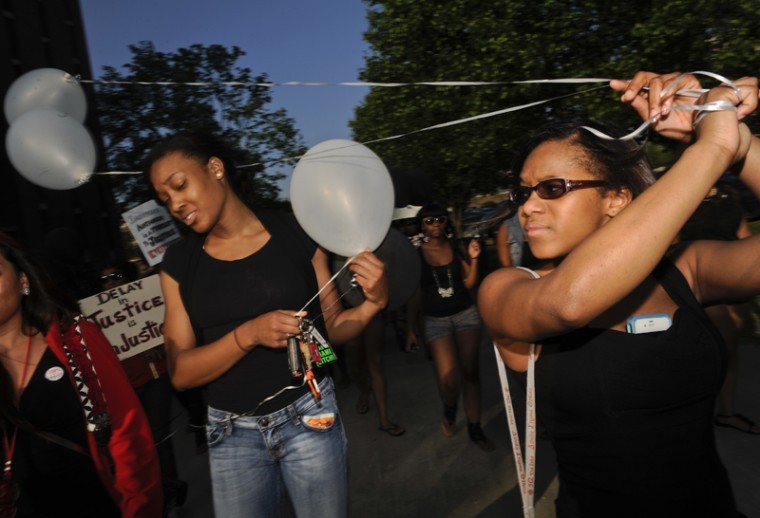Sorority hosts march in honor of slain Florida teen
April 3, 2012
Around 70 people, each with a black or white balloon, joined a march from Cherry Hall to Pearce-Ford Tower on Sunday to raise awareness of the death of Trayvon Martin.
WKU’s march was part of a nation-wide movement in protest of the killing and the police’s handling of the case surrounding Martin, a 17-year-old high school student from Florida.
In February, George Zimmerman, a community watch coordinator, allegedly killed Martin in self-defense. Martin’s family and others claim video surveillance proves otherwise. The case has since become a national controversy.
Zimmerman has not been arrested for the shooting, with police saying there is no evidence to contradict Zimmerman’s story. Many who attended the rally held signs regarding what they call injustice for Martin.
“If we want justice, we have to demand it,” said former student Keaaron Johnson of Bowling Green, who helped coordinate with the event. “We have to fight for us.”
Addressing the crowd, Johnson said the march was not just about one race.
“It’s about right and wrong,” he said.
The march ended with the release of black and white balloons at PFT. Delta Sigma Theta sorority’s Sylvia Reyes, a senior from Lawton, Okla., and one of the march’s organizers, read poetry before the balloons were released.
“Lines have been crossed, lives have been lost, long before the police were called,” she read.
The black balloons were to symbolize the racism Martin experienced, and the 17 white balloons symbolized his age, Reyes said. The word “justice” was written on the white balloons.
Reyes said she believes the prejudice that Martin experienced exists at WKU in both students and faculty.
“I think it’s a problem that’s being swept under the rug,” she said.
Greek organizations are attempting to solve this problem but more needs to be done, Reyes said.
Some alumni returned to WKU to participate in the march. Alice Gatewood Waddell of Bowling Green, who attended WKU in the 1970s, had her own experience of prejudice on campus.
Waddell said she was the first African-American to be voted Homecoming queen of WKU. However, she said for the first time in WKU’s history, there was a re-vote.
“We had to vote twice because they didn’t want to recognize it as legitimate,” Waddell said.
Waddell said she hopes the march will cause students to become aware of injustice that exists both on campus and around the country.
Waddell’s son, Jan Waddell, joined his mother at the rally.
“My son could have been Trayvon,” Alice Waddell said.
She said this is because her son has also been profiled in Kentucky.
“Any time I go into a store, I get watched,” Jan Waddell said.
However, both Waddells remain hopeful that justice will be served for Martin.
Another alumnus who attended WKU in the 1970s, James Glore, said he’s concerned that what happened in Florida to Martin is part of a trend of people taking the law into their own hands.
Like Waddell, Glore said he also experienced some prejudice when he was attending WKU. After going to a football game between WKU and the University of Louisville, Glore said police stopped him and his sister and accused them of robbing a store.
“They had us laying on the street with their guns drawn,” he said.
At the end of the march, Johnson said he did not want this movement just to be a trend on Twitter or a post on Facebook.
To truly solve the issue, Johnson said students have to become united and look beyond race.
“We can’t see each other as strangers but instead see each other as brothers and sisters,” he said.




















![Students cheer for Senator at Large Jaden Marshall after being announced as the Intercultural Student Engagement Center Senator for the 24th Senate on Wednesday, April 17 in the Senate Chamber in DSU. Ive done everything in my power, Ive said it 100 times, to be for the students, Marshall said. So, not only to win, but to hear that reaction for me by the other students is just something that shows people actually care about me [and] really support me.](https://wkuherald.com/wp-content/uploads/2024/04/jadenmarshall-600x422.jpg)



